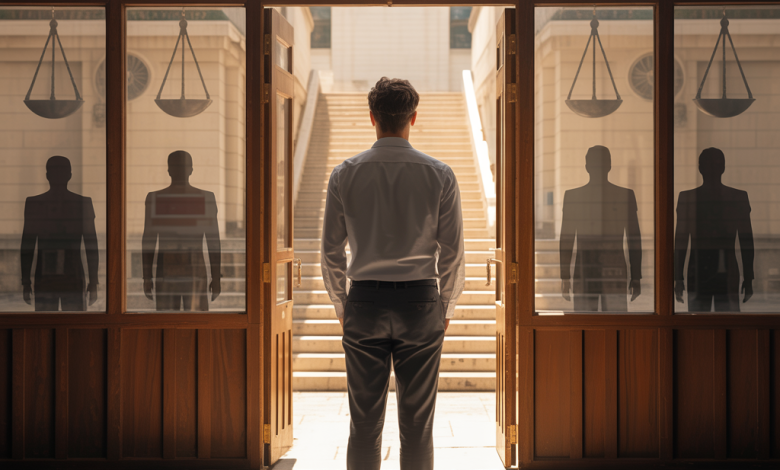What to Do If You’re Falsely Accused: A Legal Primer

INTRODUCTION
Facing a false accusation is one of the most distressing experiences anyone can endure. The shock and confusion can leave you feeling isolated, powerless, and unsure of where to turn. False allegations can arise in many areas of life—criminal cases, the workplace, family disputes, or even misunderstandings among friends. Sometimes, these accusations are the result of honest mistakes or misidentification; other times, they stem from malice, revenge, or attempts to gain an advantage in legal or personal matters.
The consequences of being wrongly accused go far beyond the immediate legal threat. Your reputation, relationships, career, and mental health can all suffer lasting harm. Even if you are eventually cleared, the stigma of the accusation may linger in your community or online.
The legal process itself can be overwhelming, with complex procedures, intimidating authorities, and the constant fear of making a mistake that could be used against you.
It is crucial to understand that you are not alone—many people have faced and overcome false accusations. The key is to act quickly, stay calm, and make informed decisions. Knowing your rights, seeking professional legal help, and following a clear strategy can make all the difference in protecting your future.
This guide will walk you through every step, from the first moments after an accusation to rebuilding your life and reputation. Whether you are dealing with criminal charges, workplace allegations, or personal disputes, the information here is designed to empower you and help you regain control of your situation.
Understanding the Impact of a False Accusation

A false accusation can affect every part of your life, often in ways you may not expect:
- Legal consequences: You may face arrest, criminal charges, court cases, or even jail if not defended properly. Legal battles can drag on for months or years.
- Reputational damage: Your name, career, and relationships can suffer, even if you are later proven innocent. News of accusations can spread quickly online and offline.
- Emotional distress: Anxiety, depression, PTSD, and social withdrawal are common. Many people experience sleep problems, panic attacks, and a loss of trust in others.
- Financial strain: Legal fees, lost income, and costs to restore your reputation can be overwhelming. You may also face job loss or difficulty finding new work.
- Family and social fallout: Trust issues, communication breakdown, and isolation from loved ones often occur. Children and spouses may also be affected by the stigma.
- Long-term consequences: Even after being cleared, records of the accusation may remain online or in background checks, affecting future opportunities.
Immediate Steps to Take

1. Stay Calm and Avoid Confrontation
- Do not contact your accuser or anyone involved in the accusation.
- Avoid retaliation or trying to “fix” things yourself, as this can be used against you.
- Remain calm and act rationally to avoid making the situation worse.
- Take time to process your emotions before making any decisions.
2. Get Legal Help Right Away
- Contact a qualified criminal defense lawyer as soon as possible.
- Do not speak to the police, investigators, or anyone else about the case without your lawyer present.
- Your lawyer will guide you on what to say and do, and protect your rights at every stage.
- Ask your lawyer about bail, restraining orders, and your rights during questioning.
3. Document Everything
- Keep a detailed journal of all events, contacts, and communications related to the accusation.
- Save all messages, emails, receipts, and records that could support your case.
- Back up digital evidence and do not delete anything, even if it seems unhelpful.
- Record dates, times, and locations of all relevant events.
- Note any witnesses or people who can confirm your version of events.
Building a Strong Defense
4. Gather and Protect Evidence
- Collect all possible evidence: texts, emails, call logs, photos, videos, receipts, and witness details.
- Organize your evidence and make copies for your lawyer.
- Write down everything you remember about the incident while details are fresh.
- Preserve physical evidence, such as clothing or objects, that could support your innocence.
- Secure digital evidence by making backups and storing them in multiple locations.
5. Find and Prepare Witnesses
- Identify people who can confirm your whereabouts or support your version of events.
- Share their contact information with your lawyer, but do not discuss case details with them directly.
- Ask witnesses to write down their memories as soon as possible to avoid forgetting details.
- Consider character witnesses who can speak to your honesty and reputation.
6. Challenge Weak or Misleading Evidence
- Your lawyer can file motions to dismiss unreliable or forged evidence.
- They may question the credibility of witnesses or request forensic analysis to disprove claims.
- If you suspect fake evidence, your lawyer must formally challenge it in court filings and demand original sources.
- Cross-examination in court can expose inconsistencies and motives for lying.
- Request independent experts to review forensic or technical evidence.
Know Your Legal Rights

- Presumption of innocence: You are innocent until proven guilty. The prosecution must prove your guilt beyond a reasonable doubt.
- Right to an attorney: You have the right to legal representation. If you cannot afford one, the court may appoint one for you.
- Right to remain silent: You do not have to answer police questions or testify against yourself.
- Due process: You are entitled to a fair and speedy trial, to confront witnesses, and to present evidence in your defense.
- Right to collect evidence: You can gather and present evidence that demonstrates the accusation’s falsehood.
- Right to appeal: If convicted, you may have the right to appeal the decision.
Legal Actions You Can Take
- Quash false charges: Your lawyer can petition the court to dismiss false cases or charges.
- File for defamation: If your reputation is harmed, you may sue for defamation or slander.
- Report false evidence: If someone lies under oath, they may be charged with perjury.
- Press charges for false reporting: Filing a false police report is a criminal offense in many places.
- Claim compensation: If acquitted, you may be able to seek compensation for damages, including reputational and emotional harm.
- Seek expungement: In some cases, you can have records of the accusation removed from public records.
Protecting and Restoring Your Reputation

- Limit communication: Only discuss your case with your lawyer. Avoid talking to friends, family, or the media about details.
- Avoid social media: Do not post about your case online. Anything you say can be used against you.
- Reputation management: After clearing your name, work with professionals to remove false information online and share positive content about yourself.
- Request retractions: Ask news sites or blogs to remove or correct false stories about you.
- Monitor your online presence: Set up alerts to track mentions of your name and act quickly to address new false accusations.
- Issue a public statement: If advised by your lawyer, consider making a public statement to clarify your position.
Coping with Emotional and Psychological Impact
- Acknowledge your feelings: It is normal to feel anger, fear, anxiety, or depression.
- Seek professional help: Therapists and counselors can help you process trauma and develop coping strategies.
- Lean on your support network: Stay close to trusted friends and family who believe in you.
- Join support groups: Organizations and online communities offer advice, helplines, and community support.
- Practice self-care: Engage in activities that reduce stress, such as exercise, meditation, or hobbies.
- Consider legal counseling: Some lawyers offer emotional support or can refer you to specialists.
Recovering and Rebuilding
Restoring Your Reputation
- Document all false accusations and report them to relevant platforms.
- Share your side of the story with trusted individuals or through public statements, if advised by your lawyer.
- Consider professional reputation management services to monitor and repair your online presence.
- Take legal action against those who continue to spread false information.
- Rebuild your professional network by reaching out to former colleagues and employers.
Rebuilding Your Life
- Focus on self-care and emotional healing through mindfulness, therapy, and journaling.
- Reconnect with loved ones and rebuild trust through open communication.
- Set new goals and embrace opportunities that align with your values.
- Seek new employment or educational opportunities if your career was affected.
- Volunteer or join community groups to regain confidence and social connections.
What Not to Do
- Do not destroy or hide evidence, even if you think it looks bad.
- Do not lie to your lawyer or the authorities.
- Do not ignore the accusation, hoping it will go away.
- Do not try to handle the situation alone—always seek legal and emotional support.
- Do not discuss your case on social media or with anyone except your lawyer.
- Do not attempt to bribe or threaten anyone involved in the case.
Support Resources
| Organization | Support Offered | Contact/Details | Region | Website/Notes |
|---|---|---|---|---|
| FASO | Helpline, legal info, emotional support, guidance through legal process | Free, independent, volunteer-run | UK | Offers confidential support and resources |
| FACT | Helpline, email support, conferences, support for professionals | General Enquiries: 0333 335 5934 | UK | Focus on professionals and carers |
| Innocence Project | Legal help for wrongful convictions, advocacy, policy reform | Online application, not by phone/email | International | Accepts cases of wrongful conviction |
| Exoneration Project | Free legal services, post-conviction support, re-entry help | Online request for help | US | Focus on post-conviction cases |
| Unfounded | Free support for unfair treatment, not-for-profit | Online support | UK | Offers peer support and advocacy |
| FalseAllegation.org | Education, rights preservation, volunteer support | Online resources | US | Provides educational materials |
| Save Our Sons | Resources for those accused of sex crimes, college focus | US-based | US | Specializes in campus-related cases |
| SAVE | Support for those accused of domestic violence | US-based | US | Advocacy and legal resources |
| Families Rising | Peer support, group mentoring, resources for families | Online resources | US | Family-focused support |
| Innocence Network (UK) | Support for carers, teachers, professionals facing accusations | Online resources | UK | Network of support organizations |
| Reputation Return | Professional reputation management, legal connections, online monitoring | Online services | International | Helps repair online reputation |
| Hester Law Group | Legal defense, personalized support, 24/7 access | US-based, Tacoma, WA | US | Criminal defense specialists |
| The National Registry of Exonerations | Database, research, support for exonerated individuals | Online database | US | Tracks exoneration cases |
| The Center on Wrongful Convictions | Legal help, research, advocacy | Northwestern University, Chicago | US | Focus on wrongful convictions |
| The Justice Gap | News, legal advice, support for the accused | Online magazine | UK | Legal news and advice |
| The Innocence Network | Legal aid, advocacy, education | Network of organizations | International | Global network for the wrongly accused |
| The Samaritans | Emotional support, crisis helpline | 116 123 (UK) | UK | 24/7 emotional support |
| Mind | Mental health support, counseling | 0300 123 3393 (UK) | UK | Mental health charity |
| National Association for People Abused in Childhood (NAPAC) | Support for those accused of abuse | 0808 801 0331 (UK) | UK | Specialist support for abuse allegations |
Final Tips
- Act quickly and follow your lawyer’s advice at every step.
- Keep all evidence safe and organized.
- Take care of your mental health and seek support when needed.
- Remember, being accused unfairly is not the end—many have cleared their names and rebuilt their lives by taking the right steps.
- Stay informed about your rights and available resources.
- Maintain hope and focus on your long-term recovery.
Quotes
“False allegations can arise in many areas of life—criminal cases, the workplace, family disputes, or even misunderstandings among friends.”
“The consequences of being wrongly accused go far beyond the immediate legal threat. Your reputation, relationships, career, and mental health can all suffer lasting harm.”
“It is crucial to understand that you are not alone—many people have faced and overcome false accusations.”
“Knowing your rights, seeking professional legal help, and following a clear strategy can make all the difference in protecting your future.”
“Even if you are eventually cleared, the stigma of the accusation may linger in your community or online.”
“With determination and the right guidance, many people have overcome false accusations and rebuilt their lives—so can you.”
Highlighted Tips
- Stay calm and do not confront your accuser.
- Contact a qualified defense attorney immediately.
- Do not discuss the case with anyone except your lawyer.
- Document everything—keep records of all events, messages, and communications.
- Gather and organize all possible evidence.
- Identify and prepare witnesses who can support your version of events.
- Limit public discussion and avoid posting about your case on social media.
- Seek professional help for emotional and psychological support.
- Monitor your online presence and consider reputation management services after your case.
- Act quickly and follow your lawyer’s advice at every step.
- Take care of your mental health and lean on trusted support networks.
- Remember: being accused unfairly is not the end—many have cleared their names and rebuilt their lives by taking the right steps.
Frequently Asked Questions (FAQs)

1. Can I sue someone for making a false accusation against me?
Yes, you may be able to file a defamation lawsuit (for libel or slander) or a claim for malicious prosecution if the accusation was knowingly false and caused you harm.
2. What should I do first if I am falsely accused?
Stay calm, avoid confronting your accuser, and contact a qualified defense attorney immediately. Do not discuss the case with anyone except your lawyer.
3. Can I be arrested or go to jail because of a false accusation?
Yes, if the accusation leads to criminal charges and you do not have a strong defense, you could be arrested or even convicted. Immediate legal action is essential to protect yourself.
4. What if I cannot afford a lawyer?
If you cannot afford a private attorney, you may qualify for a court-appointed public defender or seek help from legal aid organizations that offer free or low-cost services.
5. How long do false accusation cases usually last?
The duration varies. Simple cases may be resolved in weeks or months, while complex or serious charges can take a year or more, especially if the case goes to trial.
6. Can the person who accused me face legal consequences?
Yes, knowingly making a false accusation can result in criminal charges such as perjury, filing a false police report, or obstruction of justice. They may also be liable for damages in civil court.
7. How can I protect my reputation during and after the case?
Limit public discussion of your case, avoid social media posts, and work with your lawyer on any public statements. Afterward, consider reputation management services and seek expungement of records if possible.
8. Are false accusations common?
False accusations do occur in various contexts, including domestic disputes, workplace conflicts, and criminal cases. However, the legal system requires proof beyond a reasonable doubt, and many false allegations can be successfully challenged with the right defense.
Conclusion
Being falsely accused is a life-altering event, but it does not have to define your future. By acting quickly, seeking expert legal help, and following a clear, strategic plan, you can protect your rights and work toward clearing your name. Remember to take care of your mental health, lean on trusted support networks, and stay informed about your legal options. With determination and the right guidance, many people have overcome false accusations and rebuilt their lives—so can you.




